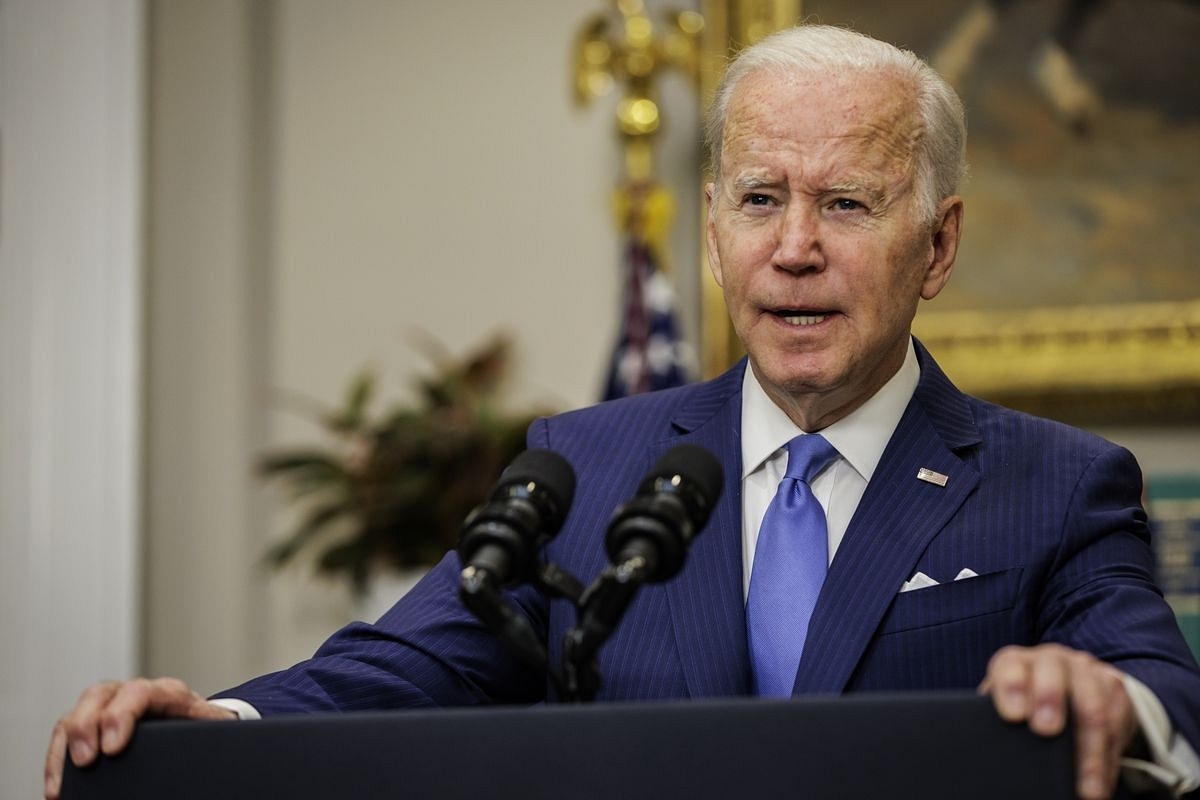World
Explained In Brief: The Landmark Inflation Reduction Act That Biden Signed
- The signing of the bill represents a major milestone for Biden and his domestic economic agenda.
- The bill's passage is a big legislative victory for Democrats as the midterms approach near. It delivers on several long-standing liberal policy goals.
- The legislation aims to make prescription drugs and health insurance cheaper; invest in clean energy and curb climate change; raise taxes on the wealthy; and cut the deficit.

Joe Biden
US President Joe Biden signed the Democrats' massive climate, health and tax bill into law yesterday at the White House. This is a major accomplishment for his domestic agenda less than three months before midterm elections.
The signing represents a major milestone for Biden and his domestic economic agenda.
The $740 billion tax, health care and climate bill was passed 220-207 with all Republicans voting against it.
Biden delivered remarks and signed the bill, known as the Inflation Reduction Act, at an event in the White House's State Dining Room, the White House announced Monday.
The bill's passage is a big legislative victory for Democrats as the midterms approach near. It delivers on several long-standing liberal policy goals.
According to ABC news, the Biden administration is planning a cross-country rollout campaign for the legislation.
Starting this week through the end of August, Cabinet members will travel to 23 states, on more than 35 trips, to tout the "Inflation Reduction Act," according to the White House.
The legislation aims to make prescription drugs and health insurance cheaper; invest in clean energy and curb climate change; raise taxes on the wealthy; and cut the deficit.
Currently about 1.4 million Americans are on Medicare. They spend more than $2000 per year on prescription drugs. This bill will ensure that they. see their costs capped at that amount. There are about 50 million Americans on Medicare Part D who will be eligible for this cost cap.
There are about 3.3 million Americans on Medicare who use insulin, who will benefit from the new $35 monthly price cap, as per the White House.
The bill allows Medicare to negotiate the prices of certain prescription drugs and requires drug companies to pay rebates for raising prices faster than inflation.
The White House estimates that about "5-7 million Americans could see their prescription drug costs decrease once Medicare begins negotiating costs."
The bill imposes a 15% minimum tax on corporations making $1 billion or more in annual profits and a 1% fee on stock buybacks. After this bill becomes law, the US federal government will invest $80 billion in the Internal Revenue Service (IRS) to crack down on tax evasion by the wealthy and corporations. This $80 billion will allowing for the hiring of thousands of more employees to audit taxpayers.
As a part of signing this bill, President Biden will sign the biggest climate bill in US history—a landmark event in the fight to reduce greenhouse gas emissions and avoid the worst effects of climate change.
One way the government aims to get there is by putting its giant thumb on energy markets so that cleaner options are more affordable to consumers. To see this strategy in action, look no further than the bill’s incentives that push America’s 122 million households to become lean, green, clean-energy machines.
According to estimates from the EPA, buildings contribute 12.5% of total US greenhouse gas emissions, so reducing their use of fossil fuels would contribute significantly to decarbonisation efforts.
To that end, the bill will provide about $100 billion for electrification programs at the neighbourhood level, the nonprofit Rewiring America told Axios.
Some of the programs are:
The Energy-Efficient Home Improvement credit: Households can claim a tax deduction of up to 30% for upgrades that save energy, such as updating electrical panels, adding insulation or more energy-efficent windows, and installing heat pumps (here’s what those are).
Residential Clean Energy credit: The bill resurrects and beefs up a credit for homeowners installing renewable energy systems like rooftop solar panels. The incentives will cut the cost of a typical $20,000 solar installation by as much as $6,000, per the NYT.
Rebates for high-efficiency appliances: Low- and middle-income families can claim rebates up to $840 for a greener stove or oven and $8,000 for a heat pump for space heating or cooling.
Government providing incentives for clean-energy upgrades is not a new trend. But by boosting the money offered and extending credit programs for many years, the Biden administration wants to show Americans hurting from inflation that they can save money on their energy bills by going green. It is the 'soft-nudge' policy in action.
By taking environmentally friendly steps such as installing solar panels and buying a heat pump water heater, a household can save $1,800 annually, as per Rewiring America.
Biden lacks the ability to connect with people and is not good at campaigning but by signing this bill into law, he hopes that his government's policies will be enough for his voters to come out and feel motivated to vote for his party in the mid-terms.
Introducing ElectionsHQ + 50 Ground Reports Project
The 2024 elections might seem easy to guess, but there are some important questions that shouldn't be missed.
Do freebies still sway voters? Do people prioritise infrastructure when voting? How will Punjab vote?
The answers to these questions provide great insights into where we, as a country, are headed in the years to come.
Swarajya is starting a project with an aim to do 50 solid ground stories and a smart commentary service on WhatsApp, a one-of-a-kind. We'd love your support during this election season.
Click below to contribute.
Latest